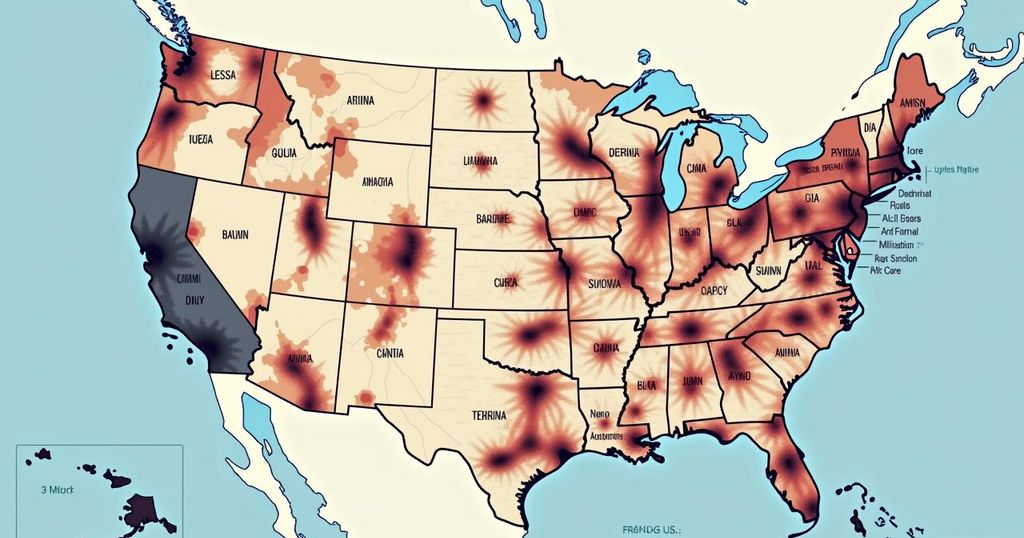Haitian Migration to the U.S.: A Political Flashpoint Ahead of the 2024 Elections
The recent influx of Haitian immigrants into the U.S. has become a pivotal political issue, particularly highlighted by statements from former President Trump and Sen. J.D. Vance. The Biden administration’s policies, including the suspension of parole extensions, position Haitian migrants at a crossroads, with approximately 1.15 million Haitians currently residing in the U.S. Florida has the largest population, while the impact on social services and local communities continues to spur political debate as elections approach.
The recent surge in Haitian migration to the United States has emerged as a significant topic of political discourse, especially as the 2024 elections approach. Both former President Donald Trump and Senator J.D. Vance have vocalized their concerns regarding the effects of this influx on communities such as Springfield, Ohio. A pivotal factor contributing to the controversial discussions is the Biden administration’s parole policy, which currently permits individuals from Cuba, Haiti, Nicaragua, and Venezuela to enter the U.S. for a two-year period under specified conditions, including temporary work permits. Haitian migrants benefit from the Temporary Protected Status (TPS), reinstated by the Biden administration earlier in the summer, which safeguards them from deportation. However, the administration’s recent decision to discontinue the extension of parole for the aforementioned nationalities complicates matters, as these individuals must seek alternate immigration status or prepare to exit the country. The political ramifications of Haitian migration have gained traction as a campaign issue, propelled in large part by sensational statements from former President Trump, who controversially asserted, “In Springfield, they’re eating the dogs, the people that came in, they’re eating the cats”. Furthermore, Senator Vance has expressed his belief that parole recipients should not be considered legal immigrants, labeling them “illegal aliens”. Statistics indicate there are roughly 1,152,604 Haitian immigrants residing in the United States, a sharp increase from approximately 731,000 in 2022. Florida dominates this demographic, hosting about 511,621 Haitians, while significant populations can also be found in New York, Massachusetts, and New Jersey. In Springfield alone, local officials estimate that between 12,000 and 20,000 Haitian residents reside in the city. Between January and August 2023, the CHNV program facilitated the entry of 200,000 migrants, with the majority (approximately 80%) settling in Florida’s major cities. The Biden administration’s involvement has included the expansion of the CHNV program in January 2023, allowing 214,000 Haitians to enter the country under specific conditions for a two-year period. While Temporary Protected Status will remain in effect until February 2026 for eligible individuals, concerns linger regarding the potential challenges those involved may face as the expiration of their parole approaches.
Haitian migration to the United States has experienced a substantial increase, driven by ongoing crises in Haiti, including violence, environmental disasters, and a lack of essential resources. The Biden administration’s policies have sought to manage this influx through parole programs and Temporary Protected Status (TPS), which provide legal shelter for individuals hailing from Haiti and other crisis-affected nations. As election campaigns begin to heat up for 2024, the political implications of this rising migration and its effects on local communities have become a point of contention among lawmakers and political figures, notably with claims made by influential politicians inciting public discourse on the matter.
In conclusion, the issue of Haitian migration into the United States has escalated into a significant political debate as the 2024 election nears. The Biden administration’s policies aimed at managing migration flows through parole and Temporary Protected Status present both opportunities and challenges for affected individuals. The politicization of this issue, driven by prominent political figures, has resulted in heightened scrutiny and discussions on immigration policy and community impact, particularly in areas such as Springfield, Ohio.
Original Source: www.foxnews.com




Post Comment